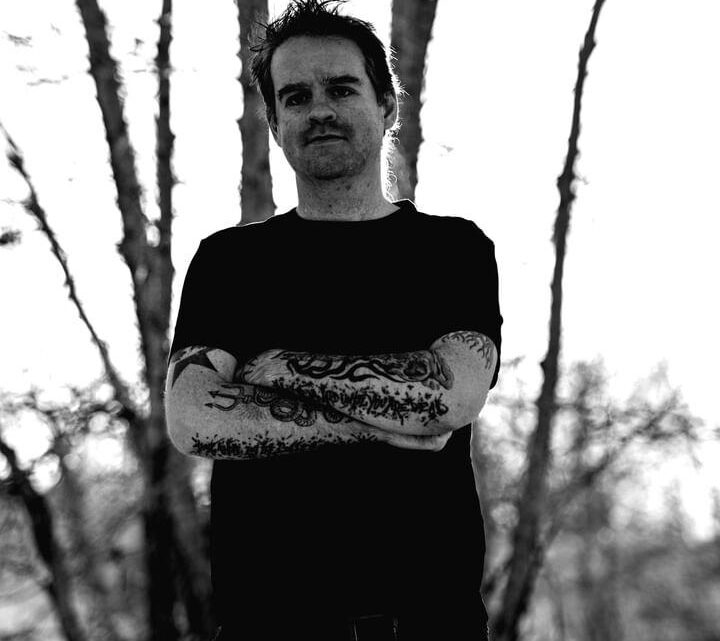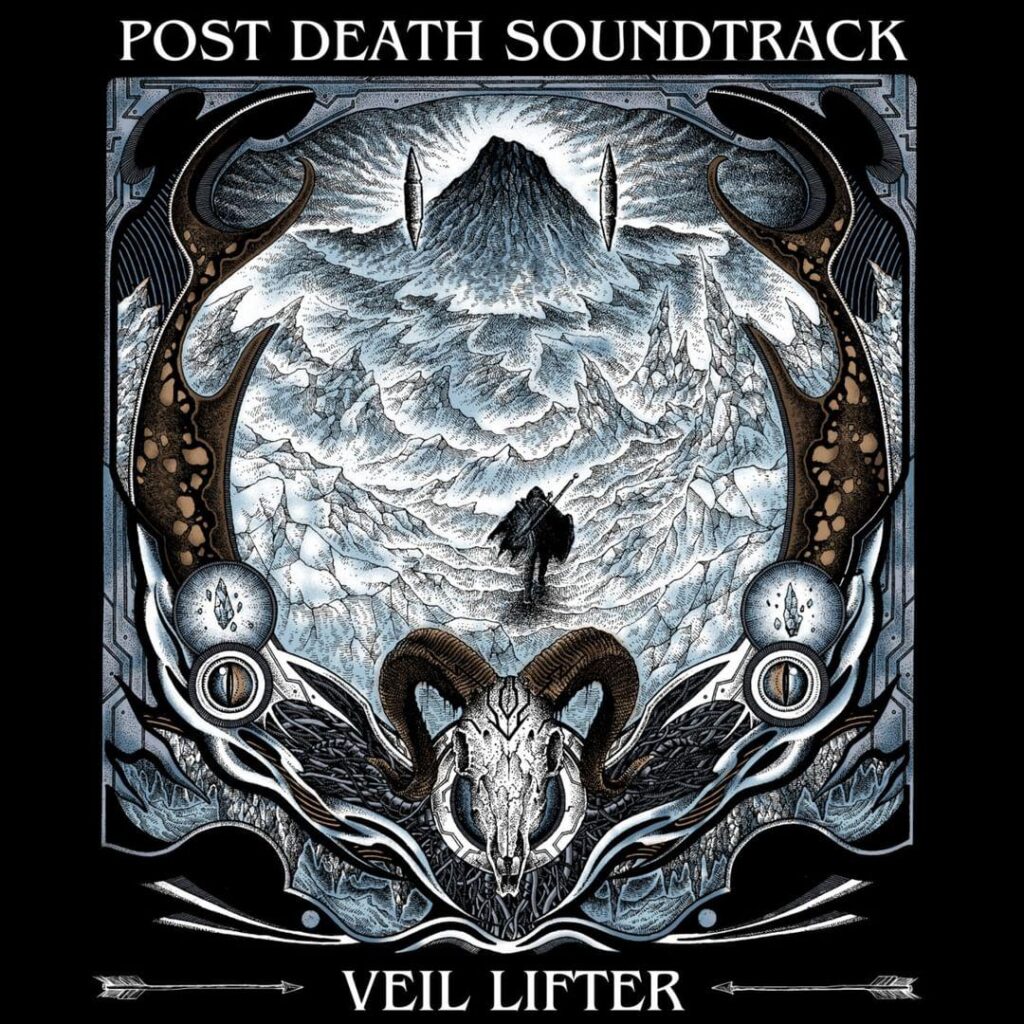Eastern-Philosophy, Truth and Depression: co-founder Stephen James discusses the poignant subjects explored in Post Death Soundtrack’s latest grunge metal album
By Edwin Fairbrother
Songwriter SPOTLIGHT: Post Death Soundtrack
Following the release of their latest album Veil Lifter in April 2024; co-founder, lead vocalist, and songwriter of Post Death Soundtrack Stephen James discusses how this grunge metal album uses metaphors to explore poignant subjects of eastern-philosophy, depression, and diminishing truth in our society today.
Listen to Veil Lifter at the bottom of this page!

SoundSight Mag (Edwin): This is Steven James of Post Death Soundtrack, and we’re here to talk about his new album, Veil Lifter, and more. So, James, first of all, I’d like to ask you—let’s take things back to the beginning of Post Death Soundtrack. Can you talk us through how you started the band?
Post Death Soundtrack (Stephen James): Yeah, it’s been a bit of a revolving door project. It was co-founded by myself and my friend Kenneth Buck. At the time, we were both in hardcore punk and metal bands, but we wanted a project where we could experiment freely. So, Post Death Soundtrack started as a literal bedroom project. It allowed us to explore a bunch of styles we were into—industrial music, like Skinny Puppy, as well as some hip-hop elements, psychedelia, and other things. It was a space where we could go all over the place musically.
Edwin: That sounds like quite an experimental beginning. How did it develop from there?
Stephen James: We started out as just the two of us in his bedroom, writing and recording. We released Weaponry in 2008. Surprisingly, I think that album still holds up—it’s just this ugly underground expression. For the next release, we recorded in Vancouver, not Calgary, because Kenneth had moved there. We brought in PA Everall on drums—he also played piano on one track—and John Irons on bass, who helped with production. That album took a much more psychedelic, experimental direction.
Edwin: It sounds like the lineup and sound were constantly evolving.
Stephen James: Yeah, it’s been a constant evolution. Kenneth moved to the east coast, so the band became a duo of myself and John Irons. Together, we worked on our third album, It Will Come Out of Nowhere, which brought back some heavier industrial sounds mixed with electronic experimentation. That one was pressed on vinyl with cover art by Colin Everall—he made this strange, horrific statue for it. Then, fast forward to our most recent album, Veil Lifter, which was a complete change in style.
Edwin: Tell me more about Veil Lifter. How did the style shift?
Stephen James: With Veil Lifter, we wanted to blend the music we loved growing up—Nirvana, Alice in Chains, Stone Temple Pilots, Tool—with modern doom and sludge metal, like Russian Circles, Mastodon, and Windhand. We also threw in some thrash influences, like …And Justice for All, which never really goes away for me. Hardcore punk, too. So, we fused those four genres—‘90s grunge, doom, thrash, and punk—and ended up with a singular sound. It was a challenge for me, writing all the guitars and vocals, but it’s the album I’ve always wanted to make since hearing records like In Utero and Dirt.
Edwin: It sounds like you were aiming for a raw, visceral sound.
Stephen James: Exactly. We wanted a singular, monolithic sound—no ballads, no electronics, no breaks—just visceral, heavy music. It’s still eclectic in terms of influences, but everything blends seamlessly. We’ve explored enough electronic elements in the past, and I could always start a side project if I wanted to go down that road again. But for Veil Lifter, I wanted something cohesive, where every song feels like part of the same mission.
Edwin: Post Death Soundtrack has had quite a journey. At one point, it seemed like you were becoming more of a solo project.
Stephen James: Yeah, after Kenneth moved and we evolved into a duo, and now, having moved back to Calgary, it’s essentially a solo project. I’m currently writing album number five and will be working with Casey Lewis again on drums and mixing. He really brought a lot of life into Veil Lifter.
Edwin: When did Post Death Soundtrack officially start?
Stephen James: We initially started in 2006. Like many bands, it’s more of a project than a traditional band. Over the years, there’s been a revolving door of members, mostly due to practical reasons—people have other interests or go their own way. But for me, this is my passion project, my baby. I’ve been the constant throughout.
Edwin: Speaking of your consistency, you’ve been the main creative force behind Post Death Soundtrack. Would you say that’s why it feels like your “baby”?
Stephen James: Definitely. As the primary lyricist and vocalist, this is my outlet. Growing up in a tough environment, discovering bands like Nirvana and Alice in Chains was a lightbulb moment. I realized music could be uncensored, raw, and a powerful form of expression. That’s what I aim for with Post Death Soundtrack—to connect with people who might be going through difficult times, whether it’s mental illness, trauma, or other challenges.
Edwin: That’s a powerful mission. Can you tell me more about your songwriting process for Veil Lifter? Did you play any instruments aside from vocals?
Stephen James: Yeah, I played all the guitars—lead and rhythm—on the album. John Irons contributed bass. Writing Veil Lifter was a personal challenge because I wanted a consistent, heavy sound with no compromises. Every riff, every vocal line, was carefully crafted to fit that vision.
Edwin: Going back to your beginnings—when did you start playing music?
Stephen James: I started playing guitar at around age 13, so that was back in ‘93. I took lessons for a couple of years, but once I could write the riffs I wanted, I focused on writing my own material. By age 15 or 16, I was recording demos and selling them at school. My first project was called The Oracle, and later, in 2000, I started Inner Surge, which was a Tool-influenced metal band.
Edwin: You’ve mentioned Tool several times. What are your biggest musical influences?
Stephen James: Tool is definitely a major influence—I listen to them almost daily. Nirvana is another massive one. Surprisingly, The Beatles are a big influence, too. Alice in Chains, Russian Circles, and Mastodon are also huge for me. Doom metal is another genre I love, especially bands like Windhand and YOB.
Edwin: What inspires your writing? What do you tend to write about?
Stephen James: A lot of my writing is inspired by living with depression. I’ve had major depressive disorder since I was around 12 or 13, so that colors a lot of my expression. I’m also deeply interested in meditation, philosophy, and spirituality. I try to write in metaphors, though—I don’t like being too direct. Instead of saying “I’m upset,” I like to paint a picture of the emotion. I find that more powerful.
Edwin: It sounds like you channel those experiences into your music in a very thoughtful way. If you had to describe your music to someone who’s never heard it before in three words, what would they be?
Stephen James: I’d say “metaphorical,” “philosophical,” and “heavy.” Maybe “grungy heavy metal” if I had to put it in a sentence!
Edwin: That sums it up well! So, let’s talk about Veil Lifter. What was the biggest challenge you faced while writing and recording the album?
Stephen James: The biggest challenge was definitely staying true to the vision I had for the album. I wanted it to have no breaks, no compromises—just heavy, visceral music from start to finish. Writing all the guitars and vocals was a challenge, but ultimately, it was rewarding because Veil Lifter is the album I’ve always wanted to make.
Stephen (Post Death Soundtrack): The challenge comes in deciding which ones to use. My song structures are usually simple, so once I have a verse riff I like, I need to find a pre-chorus and chorus that fit together. It’s not about running out of ideas—it’s about making decisions. A lot of artists struggle with letting go, deciding something is good enough, and moving forward. There’s an art to knowing when to stop overthinking and just trust that what you’ve created is solid.
Edwin: That’s a great piece of advice. I think a lot of artists struggle with that—just moving forward instead of agonizing over options. It’s a common issue during production, too. Why do you think releases take longer than they should?
Stephen: Definitely, it’s because of constant tinkering. But things moved quickly for me once we handed everything over to Casey for drums, mixing, and mastering. It was a smooth and efficient process after that.
Edwin: Nice! Now, the album title, Veil Lifter, is intriguing. What’s the meaning behind it?
Stephen: The title comes from a concept in Eastern philosophy. I’ve read a lot of Eastern texts, including Hinduism, Buddhism, and the Bhagavad Gita. There’s a quote about lifting the veil of ignorance, which speaks to seeing reality clearly, as it is, instead of through the filter of our ceaseless thoughts and projections. We often walk through life divided from the world around us, but lifting the veil means seeing everything as interconnected.
When you lift the veil of ignorance, you stop lying to yourself. A lot of people go through life with scripts they tell themselves, which can be harmful. I recently went through a process of letting go of those scripts, and it’s freeing. It’s about seeing the truth clearly and moving forward with honesty.
Edwin: That’s fascinating. Let’s talk about some of the songs on the album. In Killer of the Doubt, who or what is the “killer of the doubt”? Is it a metaphor for something or someone?
Stephen: Killer of the Doubt is a metaphor for myself. The song was inspired by personal trauma, including relationship and divorce struggles. There’s a lyric that says, “When his body hit the ground, here is something that cannot be devoured,” which represents the idea that the inner spirit is untouchable. To achieve anything in life, you need purity and confidence—no room for doubt. So, in a sense, I am the killer of doubt in the song.
Edwin: Another track that caught my attention was Low Down Animal. What’s the meaning behind that one?
Stephen: Low Down Animal came from a really difficult period after my divorce, which felt almost like a Hollywood-level horror story. The hyena became a central metaphor for me—a creature often viewed with fear and contempt, but one that survives through craftiness and cooperation. Hyenas aren’t dominant like lions or bears, but they work together to thrive.
After my divorce, I isolated myself for a long time, but I’ve started creating a pack—a network of talented people who support each other, both mentally and creatively. That’s what Low Down Animal is about: embracing the outsider role and surviving the chaos life throws at you.
Edwin: That’s a powerful image. There’s a lot of depth behind your music. Can you talk about Icy Underground and how it relates to your experiences?
Stephen: Icy Underground is a dystopian song. It reflects how we’re all down here waiting for something—whether it’s Providence or our individual hopes and beliefs. The verses are forceful, critiquing the constant noise of ideas and beliefs we impose on each other.
The chorus imagines letting go of those ideas—of who we think we are. It envisions a kind of healing in the icy underground, symbolizing a release of the stresses, traumas, and pains we hold onto. Despite the dark themes, the song is ultimately about hope and healing.
Edwin: Can you share a lyric from Icy Underground that you find particularly powerful?
Stephen: I really like the opening line: “In this room, only elephants bury all the evidence. Truth is of no consequence.” It’s a commentary on our modern world, especially in politics. It seems like truth doesn’t matter much anymore. People just make things up and choose their own realities, whether it’s in politics or conspiracy theories. It’s a sarcastic take on the way people invent their own narratives and live by them.
Edwin: Absolutely. That’s a striking commentary. Now, at Soundsight Mag, we focus on independent artists. What do you think is the best part of being an independent artist?
Stephen: The best part is that you’re in control. You make your own business decisions, create your own brand, and every effort you put in separates you from those who don’t. For example, we’re about to launch a Shopify store with merchandise like shirts, vinyl, and caps. Everything ties back to the theme of Veil Lifter. The ram on the album cover represents a creature that can survive on the mountain of unbecoming, much like the character in Veil Lifter.
Being independent means you choose your own path. A lot of artists expect success to come to them just because they’ve made a good record, but it’s not that simple. You need to constantly promote your work, advertise, and put energy into growing your audience.
Edwin: That’s great advice for independent artists. Do you think independence has also influenced your creativity?
Stephen: Absolutely. The only way to create something meaningful is to make it personal and potent. I don’t believe in accepting feedback or trying to shape my sound to fit what others think is marketable. Art should come from your soul, and you should present it exactly how you want it, without compromise. That’s the essence of being a true artist—playing from your soul and delivering it as is.
Edwin: Spoken like a true independent artist! So, what are your plans for 2024? Is it all about promoting Veil Lifter?
Stephen: Yes, I’m focusing heavily on promoting Veil Lifter right now. We’re working with several PR teams, and it’s really starting to gain traction with radio play, magazine features, and podcasts. I’m also starting work on the next album—album number five. I’ve already got a lot of ideas stored, but I plan to capture where I’m at right now and move forward from there.
I’m also collaborating on a few side projects, including a heavy duo with guitarist Scott Taylor and a four-song EP with my friend Jay Morris, who’s a rapper from Texas. That one will have a mix of doom and trap elements.
Edwin: Sounds like you’ve got a busy year ahead! Lastly, what are your long-term goals for your music?
Stephen: I like to take things step by step. My goal is to create a lasting legacy and make each album better than the last. I want to grow the audience as much as possible and eventually take the music live and tour. But right now, it’s all about building the foundation and seeing where that takes us.
Edwin: That’s a great approach. Thank you for chatting with us, Stephen! For our readers, if you want to join the pack and listen to Veil Lifter, check out Post Death Soundtrack on their socials and Spotify. We’ll include all the links in the article.
Stephen: Thanks so much, Edwin. Take care!
Edwin: You too!



